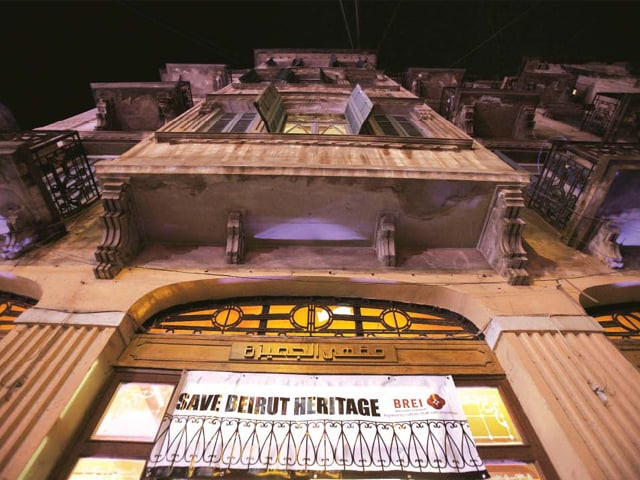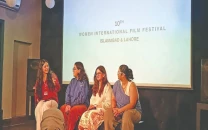Beirut’s iconic Glass Café takes its last bow
The history of this cafe is closely intertwined with the history of Beirut: Angele Abi Haidar.

Beirut’s iconic Glass Café takes its last bow
“The history of this cafe is closely intertwined with the history of Beirut,” said Angele Abi Haidar, whose family has operated the Glass Cafe — which first opened its doors in 1920.
“Every inch of this cafe carries a story,” she said. “It has witnessed the country’s major political events and survived a civil war which lasted 15 years.”
Abi Haidar shared her dismay at losing a long-run legal battle with the building’s owner over the rent which was said to jump threefold, from $50,000 a year to 150,000 dollars - a price the owner could simply not afford.
Located in the traditional but trendy neighbourhood of Gemmayzeh of Gouraud Street, the café is named after French General Henri Gouraud who signed a decree proclaiming the creation of the state of Lebanon in 1920. With supreme architecture from the veteran age of the Ottoman’s with a modern high rises on the street crowded by pubs, nightclubs and restaurants, the Glass Café is one of the few establishments that still serves authentic Lebanese food with traditional music playing in the background.
From intrinsically painted tiles imported from Italy in the 20th Century, to beautifully lit chandeliers and classic bistro tables, the café has borne witness to the rise of Lebanon’s presidents, prime ministers and national poets.
“The likes of President Camille Chamoun, Prime Minister Saeb Salam and (Maronite Christian leader) Pierre Gemayel was among our customers. The cafe was also popular among intellectuals who used to sit for hours and hours debating culture and poetry,” said Abi Haider.
Abi Haider who sat reminiscing the old times and recalling memories from her childhood, says she remembers watching her grandfather greet customers, the click of backgammon dice, the gurgle of water pipes and the famous songs by the Lebanese diva Fairuz which completed the ambience of the house.
“The demarcation line that split Beirut in half (between Christians and Muslims) during the civil war wasn’t very far from here. Most of the residents in the neighbourhood fled but my father would open the cafe every day. When the bombs would fall, the few customers would rush to the kitchen in the back to hide and then, when things would calm down, they would sit back at their tables,” she added. “It was all very surreal.”
While Abi Haider wraps up years of heritage in her café, the building’s owner, Massoud Renno claims he does not plan to tear the place down but wants to refurbish it before deciding its fate.
However, many disagree with Renno’s stance; such is the case of Giorgio Guy Tarraf, a member of the Save Beirut Heritage organisation which collaborated a goodbye concert for the cafe on Wednesday evening. “Heritage doesn’t only mean beautiful old stones. When one speaks of heritage it also means memories, people and places,” commented Tarraf.
Khalil Asmar, an owner of a bookstore in the neighbourhood, said, “Part of Beirut’s history will be buried when the Glass Cafe shuts its doors on Monday. Ever since I was a child, the cafe has been there,” he said wistfully. “It’s like home to me, “added Asmer.
“I used to watch customers play cards and backgammon, and I recall the poet Michel Akl sitting there for hours writing his poems.”
Although Abu Haider remains tormented by the closure of her family strore, she has opened another cafe in the north of Beirut but said that nothing could ever replace the memories of the Glass Cafe.
“It’s ironic, successive wars failed to shut it down,” she said bitterly. “And now, a thirst for fast cash is forcing us to close,” added Abi Haider.
Yesterday’s coffee culture - Pak Tea House
Lahore’s Pak Tea House made waves in the history of Pakistan and was traditionally frequented by artistes and intellects which included the famous Faiz Ahmed Faiz, Ibn-e-Insha, Ahmed Faraz, Saadat Hasan Manto, Muneer Niazi , Intezar Hussain and Syed Qasim Mahmood. The tea house was more than just a rest gate to the sage; it also drew in an avenue of youngsters that felt free to raise their opinions in a non-judgmental environment.
A few years back the Pak Tea House was shut down due to diminishing business.
However, off late the ‘Pak Tea House’ title has been revived as a bloggers corner. “Pak Tea House is a little corner in the blogosphere that will endeavour to revive the culture of debate, pluralism and tolerance. It has no pretensions nor illusions but the motivation of a few people who want to see Pakistan a better place - where ideas need to counter the forces of commercialism, adverse effects of globalisation and extremism. Ideas must translate into action that leads us to an equitable, just and healthy society.” Pak Tea House Facebook page.
Published in The Express Tribune, January 8th, 2011.



















COMMENTS
Comments are moderated and generally will be posted if they are on-topic and not abusive.
For more information, please see our Comments FAQ